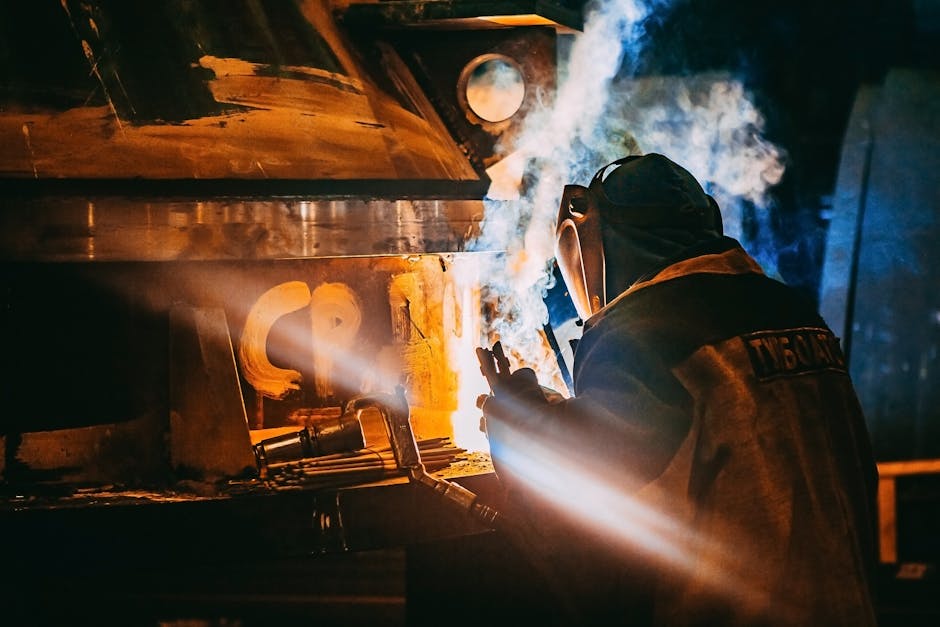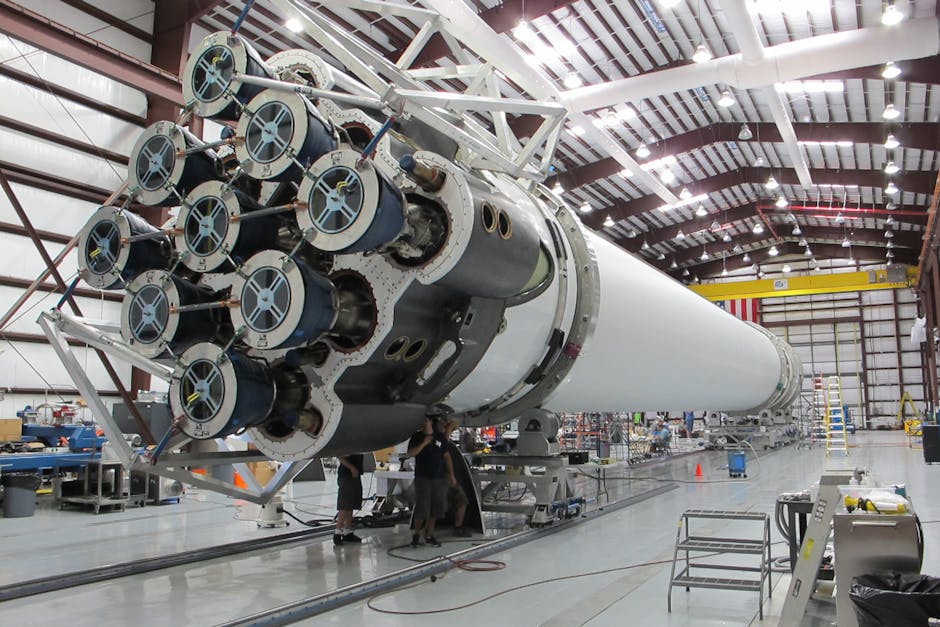The Importance of Welding Services in UK’s Manufacturing Landscape
Welding services play a crucial role in the manufacturing landscape of the United Kingdom, serving as the foundation for numerous industries and sectors. The significance of welding extends beyond mere joining of materials; it directly influences the economic, technological, and safety aspects of manufacturing processes.
This introduction provides an overview of the pivotal role welding services play, encompassing their impact on the economy, advancements in technology, assurance of quality, adherence to safety standards, and their contribution to infrastructure development.
Understanding the importance of welding services is essential for comprehending the intricate web of interconnected industries and the future prospects for manufacturing in the UK.
Key Takeaways
- Welding services contribute to the overall GDP and employment figures in the UK’s manufacturing sector.
- Technological advancements in welding improve efficiency, precision, and safety in metal fabrication processes.
- Quality assurance and compliance ensure the integrity and reputation of manufacturing businesses.
- Welding plays a crucial role in infrastructure development and future prospects, with rising demand for high-quality welded products across various industries.
Economic Impact of Welding Services

The economic impact of welding services in the UK’s manufacturing landscape can be quantified by examining the contribution of these services to the overall GDP and employment figures. Welding services play a vital role in driving economic growth within the manufacturing sector. By providing the necessary expertise and infrastructure for the fabrication and assembly of metal components, welding services are instrumental in sustaining and enhancing the productivity of various industries.
Moreover, the demand for welding services fosters the creation of employment opportunities, thereby contributing to the growth of a skilled workforce. Skilled welders are essential for maintaining the quality and integrity of manufactured products, which, in turn, bolsters the reputation of UK manufacturing on a global scale. The presence of a competent workforce specialising in welding also attracts investment and promotes innovation within the manufacturing sector.
In essence, the economic significance of welding services cannot be overstated. They not only contribute to the GDP through their direct impact on manufacturing output but also foster the development of a skilled labour force, which is crucial for the sustained growth and competitiveness of the UK’s manufacturing landscape.
Technological Advancements in Welding

Significant advancements in welding technology have revolutionised the manufacturing landscape in the UK, enhancing efficiency, precision, and safety in metal fabrication processes. These technological advancements have been instrumental in shaping the industry and have led to notable changes in the way welding is carried out.
Some of the key technological advancements include:
-
Welding Automation: The introduction of automated welding systems has significantly improved the speed and accuracy of welding processes. These systems utilise robotics and advanced machinery to carry out intricate welding tasks with minimal human intervention, thereby increasing productivity and reducing the margin of error.
-
Advanced Materials and Techniques: Technological advancements have led to the development of new welding materials and innovative techniques. These advancements have enabled welders to work with a wider range of materials, including exotic alloys and composite materials, while maintaining the integrity of the welds.
-
Digital Welding Technologies: The integration of digital technologies in welding has brought forth tools such as computer-aided design (CAD) software, welding simulation programmes, and real-time monitoring systems. These tools aid in pre-visualisation of welds, optimising welding parameters, and ensuring quality control throughout the welding process.
Quality Assurance in Manufacturing

Quality assurance in manufacturing plays a critical role in ensuring that welding processes adhere to industry standards and compliance regulations. By maintaining high-quality standards, manufacturers can uphold the integrity of their products, ensuring safety and reliability for end-users.
As such, the impact of quality assurance on welding extends beyond the production process, influencing the overall reputation and success of manufacturing businesses.
Welding Standards and Compliance
Compliance with welding standards is essential for ensuring the quality and reliability of manufacturing processes in the UK. Adhering to welding regulations and obtaining welding certification is crucial for maintaining high standards in the industry.
The following are key aspects of welding standards and compliance:
-
Welding Certification: Ensuring that welders possess the necessary qualifications and skills to perform high-quality welding work.
-
Regulatory Compliance: Adhering to the established welding codes and standards to guaranty the safety and integrity of welded products.
-
Quality Assurance Measures: Implementing rigorous quality control processes to maintain the highest standards of welding in manufacturing.
Strict adherence to welding standards and compliance not only upholds the quality of products but also contributes to the overall safety and reliability of the manufacturing landscape in the UK.
Impact on Product Integrity
Ensuring product integrity through stringent quality assurance measures is paramount in the manufacturing landscape of the UK. Welding services play a crucial role in maintaining product durability and material strength.
The integrity of welded components directly impacts the overall quality and performance of manufactured products. Through meticulous quality assurance processes, such as non-destructive testing and adherence to welding standards, manufacturers can ensure that welded joints possess the necessary strength and durability to withstand operational demands.
This not only enhances the reliability of the end products but also contributes to the safety and longevity of the manufactured goods. By upholding high standards of welding integrity, manufacturers in the UK can instil confidence in the quality of their products, thereby reenforcing their position in the competitive global market.
Safety Standards and Welding Practises

When it comes to welding services, safety regulations play a pivotal role in ensuring the well-being of workers and the quality of the final product.
Implementing welding best practises not only enhances the efficiency of the process but also contributes to maintaining a secure working environment.
It is crucial to understand the impact of welding practises on workplace safety, as negligence in this area can lead to severe consequences.
Safety Regulations in Welding
Adhering to stringent safety standards and welding practises is crucial in the welding services industry in the UK’s manufacturing landscape. To ensure the safety of workers and the quality of work, the following measures are essential:
-
Safety Equipment: Welders must utilise appropriate personal protective equipment (PPE), including welding helmets, gloves, and flame-resistant clothing to safeguard against burns, sparks, and fumes.
-
Training Programmes: Comprehensive training programmes should be in place to educate welders on safe welding practises, the proper operation of equipment, and the identification of potential hazards.
-
Regulatory Compliance: It is imperative for welding companies to adhere to all relevant safety regulations and standards set forth by regulatory bodies to maintain a safe working environment and meet legal requirements.
Welding Best Practises
Welders in the UK’s manufacturing landscape must prioritise safety standards and best practises to ensure a secure and efficient working environment. Adhering to safety regulations is vital, but implementing proper welding techniques and providing comprehensive welder training are equally important.
Welding best practises encompass a range of factors, including selecting the appropriate materials, maintaining equipment, and employing the correct welding methods. Moreover, ensuring that welders are well-trained in the latest welding technologies and techniques is crucial for achieving high-quality and durable welds.
Impact on Workplace Safety
Implementing stringent safety standards and adhering to proper welding practises are imperative for ensuring workplace safety in the UK’s manufacturing landscape. To achieve this, the following measures are essential:
-
Workplace Training: Comprehensive training programmes should be provided to all personnel involved in welding processes. This includes education on safe welding techniques, hazard awareness, and emergency procedures.
-
Safety Equipment: The provision and proper use of personal protective equipment (PPE) such as welding helmets, gloves, and safety goggles are paramount. Additionally, ensuring the availability and functionality of fire extinguishers and ventilation systems is crucial.
-
Regular Safety Audits: Conducting routine inspections and audits of welding equipment, workspace, and safety protocols is essential to identify and rectify any potential safety hazards.
Adhering to these measures can significantly mitigate workplace accidents and promote a safer working environment.
Role of Welding in Infrastructure Development

Welding plays a crucial role in the development of infrastructure across the UK. In infrastructure development, welding is indispensable in construction projects, as it is used in the fabrication of bridges, roads, railways, and buildings. Welded structures provide the necessary strength, durability, and stability required to support the country’s infrastructure. Infrastructure development projects heavily rely on welding processes such as arc welding, MIG welding, and TIG welding to join metal components, ensuring the integrity and longevity of the infrastructure.
The use of welding in infrastructure development is not only limited to new construction but also encompasses repair and maintenance activities. Welding services are essential for the upkeep of existing infrastructure, including bridges, pipelines, and industrial facilities, ensuring that they remain safe and functional over time. Moreover, welding technologies continue to evolve, offering innovative solutions for infrastructure development, such as advanced welding techniques and materials that enhance the overall quality and longevity of construction projects.
Future Prospects for Welding Services in the UK

The demand for advanced welding technologies is expected to drive significant growth in the UK’s manufacturing landscape. Industry trends indicate a shift towards automation, robotics, and artificial intelligence in welding processes, leading to increased efficiency and precision. This, in turn, will necessitate a skilled workforce capable of operating and maintaining these advanced technologies.
Moreover, market demand for high-quality welded products continues to rise, driven by the need for durable and reliable components across various industries. To remain competitive in the face of global competition, UK welding services will need to focus on innovation and sustainability, alining with the growing emphasis on environmentally friendly and cost-effective solutions.
Additionally, the integration of digital technologies, such as augmented reality and big data analytics, is poised to revolutionise welding practises, offering new opportunities for process optimisation and quality control.
Frequently Asked Questions
Are There Any Specific Government Regulations or Policies That Impact the Use of Welding Services in the UK Manufacturing Landscape?
Government regulations in the UK manufacturing landscape impact the use of welding services. Policies on welding safety and infrastructure standards are crucial. These regulations ensure the quality, safety, and environmental impact of welding processes in construction and infrastructure projects.
How Are Welding Services Contributing to Sustainability and Environmental Efforts Within the Manufacturing Industry in the Uk?
Welding services in the UK’s manufacturing industry contribute to sustainability and environmental efforts through the use of advanced welding techniques, energy-efficient processes, and compliance with environmental regulations. This ensures a reduced carbon footprint and promotes eco-friendly manufacturing practises.
What Are Some Lesser-Known Applications or Industries That Heavily Rely on Welding Services in the Uk?
Lesser known applications and specialised industries heavily rely on welding services in the UK. Innovative techniques cater to emerging sectors, enhancing the role of welding services in sectors such as aerospace, automotive, and renewable energy, underscoring their significance.
What Are the Typical Qualifications and Certifications Required for Welders to Work in the UK Manufacturing Sector?
Typical qualifications for welders in the UK manufacturing sector include vocational training, apprenticeships, and relevant certifications such as City & Guilds or BTEC. Welder certifications often include qualifications in specific welding processes and materials.
How Do Welding Services in the UK Compare to Those in Other Countries, and What Factors Contribute to the UK’s Competitive Advantage in This Area?
In the realm of international comparison, the UK’s welding services stand out with their utilisation of cutting-edge technological advancements. This, along with a focus on precision, innovation, and skilled workforce, contributes to the UK’s competitive advantage in welding services.
Conclusion
In conclusion, welding services play a crucial role in the fabric of UK manufacturing. They serve as the strong, invisible bonds that hold together the intricate machinery of the industry.
With technological advancements, strict quality assurance, and adherence to safety standards, welding ensures the foundation of a strong and resilient manufacturing landscape.
As the UK continues to build and expand its infrastructure, the future prospects for welding services remain bright. They serve as the welding torch that lights the path to progress.
Contact us to discuss our services now!
